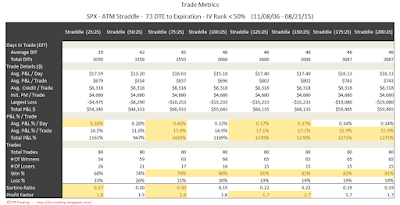For background on the setup for the backtests, as well as the nomenclature used in the charts and tables below, please see the introductory article for this series: Option Straddle Series - P&L Exits.
No IV Rank Filter
In this section we will look at the results of entering one trade for every monthly expiration regardless of the implied volatility rank (IVR) of the SPX on the date of entry. Entering these trades at 73 DTE and utilizing our loss exits and 25% credit exits (described here), resulted in the equity curves below...not as good as the 59 DTE variations,...similar to the 66 DTE variations.
 |
| (click to enlarge) |
The trade metrics for these different exits are shown in the table below. Again, the (75:25) variation stands out with the top P&L % per day reading, highest overall P&L % value, highest P&L % per trade, and a solid win rate of 82%. The second best variation was the (125:25) strategy. These numbers are are similar to the 59 DTE variations.
 |
| (click to enlarge) |
The table below shows the distribution of returns in five-number summary format. Hat-tip to Tastytrade.
 |
| (click to enlarge) |
Below are three sets of scatter plots for selling 73 DTE ATM SPX straddles. The first image contains one scatter plot per strategy and shows P&L in percentage terms versus IVR for the SPX. The IVR was captured on the day each trade was initiated. The trend of increasing P&L with increasing IVR continues and is clearly visible in the scatter plots.
 |
| (click to enlarge) |
The next image shows P&L in percentage terms versus initial ATM IV. This ATM IV was captured on the day each trade was initiated. Higher IV resulted in higher returns, but the majority of the profitable trades occurred at an IV below 40. The majority of the winning and losing trades occurred below an IV of 30.
 |
| (click to enlarge) |
The third image shows P&L in percentage terms versus days-in-trade (DIT). We see the same two patterns that we observed before...when managing losses early (25%, 50%), the losses were fairly evenly distributed across DIT. As the loss management becomes less aggressive (125% and higher), we see that most of the losses were not realized until expiration...meaning many of these particular losses were less than our threshold values. Also, for this particular DTE and profit management level, profitable trades generally occurred anywhere from 20 to 70 days...a huge range with no clear clustering.
 |
| (click to enlarge) |
IV Rank > 50% Filter
In this section we will look at the results of entering one trade for every monthly expiration only when the IVR of the SPX is greater than 50% ( >50% ). Entering these trades at 73 DTE and utilizing our loss exits and 25% credit exits (described here) resulted in the equity curves below. These curves are have the best returns of the filtered, 25% credit exit variations across DTE, but these curve shapes to not appear as good as the 59 DTE variations.
 |
| (click to enlarge) |
The trade metrics for these different exits are shown in the table below. There are significantly fewer trades that meet the >50% IVR criteria...a bit more than 23% of the available trades...this is a consistent trend with the > 50% IVR filter. Using this IVR filter, causes six of the eight strategy variations to have win rates of 92%. The (75:25) variation was again the best out of the eight strategies.
 |
| (click to enlarge) |
The table below shows the distribution of returns in five-number summary format.
 |
| (click to enlarge) |
IV Rank < 50% Filter
In this section we will look at the results of entering one trade for every monthly expiration only when the IVR of the SPX is less than 50% ( <50% ). Entering these trades at 73 DTE and utilizing our loss exits and 25% credit exits (described here) resulted in the equity curves below.
 |
| (click to enlarge) |
The trade metrics for these different exits are shown in the table below. The metrics for the variations associated with this lower IVR filter were not as good as either the non-IVR filtered strategies or the IVR > 50% strategies.
 |
| (click to enlarge) |
The table below shows the distribution of returns in five-number summary format.
 |
| (click to enlarge) |
In the next post we will look at the backtest results of 73 DTE ATM SPX short straddles using the same loss thresholds as above, but with profit taking occurring at 35% of the credit received.
Follow my blog by email, RSS feed or Twitter (@DTRTrading). All options are available on the top of the right hand navigation column under the headings "Subscribe To RSS Feed", "Follow By Email", and "Twitter".
No comments:
Post a Comment